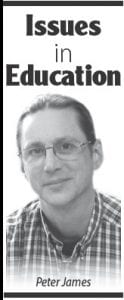“May you live in an interesting age” is more often cited as a curse than a blessing. For many, the changes that accompany an “interesting age” are sources of grief, anxiety, and frustration. There is the loss of the familiar, the uncertainty of the future, and the challenges that are part of the transition. Yet with these troubles comes a collection of opportunities that didn’t exist before, opportunities for us to build on the successes of the past and find new ways to address the nagging problems we have lived with. We need to decide how we will respond.
We are living through an interesting age in education right now. This is true at all levels: from within our classrooms through our schools, communities, states, nation, and world. Global connectedness and global competitiveness have made education an integral part of every country’s economic, political, and social policy. Important changes are coming to America this year as a new federal education law goes into effect at the same time voters are engaged in the election of a new administration. What does the future of federal control, accountability, and funding of education look like? Well, what should it look like, and how are you going to help shape it?
The new federal education law pushes more decisions regarding academic standards, school performance, and teacher evaluation to the state level. What should Minnesota’s legislature do to ensure we set high standards, serve the needs of all learners, and develop a system of education that provides the foundation for successful lives? What systems of accountability should we have for students, teachers, administrators, and schools? How should education be funded, and at what level? These are all areas that are open for change and the opportunities to have influence in these decisions are as close as your telephone or computer: let your legislators know your priorities!
Locally, we are experiencing our own interesting age. Education is woven into the fabric of our county, and the financial, organizational, and philosophical challenges we continue to wrestle with in education affect many other areas. Property taxes, affordable housing, and our social and economic health are all connected to the decisions we make and the effectiveness we can achieve in our education environment. What better way to attract and keep young families in the area than with the demonstrated ability to provide their children with a high quality education? Where else should we work to create a better source of committed, skilled local workers than with our own career-minded graduates? How do we hold on to our best and brightest so they continue to enrich our schools and community? What level of local tax support are we willing to provide to achieve these goals?
The answers to these and other important questions are answers we are going to create together. Our action – or inaction – will affect the decisions that our education leaders make. This time of change gives all of us a chance to embrace new approaches to solving old problems, to put new energy into practices that are working, and to recommit ourselves to achieving the goals we share for our children and community.
There are forums for community input to school boards and opportunities for volunteers to engage with the schools to help them move forward. As we work through this interesting age, “hope” is not a strategy and “no” is not a solution. How can we look beyond our current struggles and seize life’s opportunities before the moment passes us by? That is the challenge of every age, and our challenge now.
Each month a representative of our local schools will offer thoughts in Issues in Education. This month’s contributor is Peter James, Great Expectations School.



Loading Comments